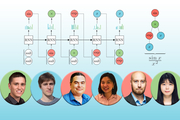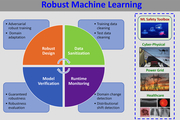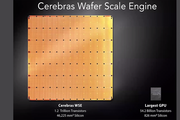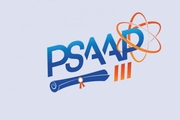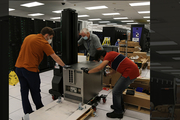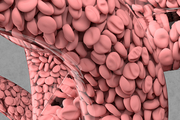Did you know we have a monthly newsletter? View past volumes and subscribe.
Novel deep learning framework for symbolic regression
March 18, 2021 -
LLNL computer scientists have developed a new framework and an accompanying visualization tool that leverages deep reinforcement learning for symbolic regression problems, outperforming baseline methods on benchmark problems. The paper was recently accepted as an oral presentation at the International Conference on Learning Representations (ICLR 2021), one of the top machine learning...
CASC research in machine learning robustness debuts at AAAI conference
Feb. 10, 2021 -
LLNL’s Center for Applied Scientific Computing (CASC) has steadily grown its reputation in the artificial intelligence (AI)/machine learning (ML) community—a trend continued by three papers accepted at the 35th AAAI Conference on Artificial Intelligence, held virtually on February 2–9, 2021. Computer scientists Jayaraman Thiagarajan, Rushil Anirudh, Bhavya Kailkhura, and Peer-Timo Bremer led...
Lawrence Livermore computer scientist heads award-winning computer vision research
Jan. 8, 2021 -
The 2021 IEEE Winter Conference on Applications of Computer Vision (WACV 2021) on Wednesday announced that a paper co-authored by LLNL computer scientist Rushil Anirudh received the conference’s Best Paper Honorable Mention award based on its potential impact to the field. The paper, titled "Generative Patch Priors for Practical Compressive Image Recovery,” introduces a new kind of prior—a...
LLNL physicist wins Young Former Student award
Dec. 16, 2020 -
Texas A&M University’s Department of Nuclear Engineering on December 10 announced it has honored LLNL physicist Kelli Humbird with its 2020-21 Young Former Student award for her work at LLNL in combining machine learning with inertial confinement fusion (ICF) research. Humbird graduated from Texas A&M with a PhD in nuclear engineering in 2019. Since joining the Laboratory as an intern in 2016...
NeurIPS papers aim to improve understanding and robustness of machine learning algorithms
Dec. 7, 2020 -
The 34th Conference on Neural Information Processing Systems (NeurIPS) is featuring two papers advancing the reliability of deep learning for mission-critical applications at LLNL. The most prestigious machine learning conference in the world, NeurIPS began virtually on Dec. 6. The first paper describes a framework for understanding the effect of properties of training data on the...
Model for COVID-19 drug discovery a Gordon Bell finalist
Nov. 17, 2020 -
A machine learning model developed by a team of LLNL scientists to aid in COVID-19 drug discovery efforts is a finalist for the Gordon Bell Special Prize for High Performance Computing-Based COVID-19 Research. Using Sierra, the world’s third fastest supercomputer, LLNL scientists produced a more accurate and efficient generative model to enable COVID-19 researchers to produce novel compounds...
DOE announces five new energy projects at LLNL
Nov. 13, 2020 -
The DOE today announced two rounds of awards for the High Performance Computing for Energy Innovation Program HPC4EI), including five projects at LLNL. HPC4EI connects industry with the computational resources and expertise of the DOE national laboratories to solve challenges in manufacturing, accelerate discovery and adoption of new materials and improve energy efficiency. The awards were...
What put LLNL at the center of U.S. supercomputing in 2020?
Nov. 12, 2020 -
The HPC world is waiting for the next series of transitions to far larger machines with exascale capabilities. By this time next year, the bi-annual ranking of the Top500 most powerful systems will be refreshed at the top as Frontier, El Capitan, Aurora, and other DOE systems come online. While LLNL was already planning around AI acceleration for its cognitive simulation aims and had a number...
AI gets a boost via LLNL, SambaNova collaboration
Oct. 20, 2020 -
LLNL has installed a state-of-the-art artificial intelligence (AI) accelerator from SambaNova Systems, the National Nuclear Security Administration (NNSA) announced today, allowing researchers to more effectively combine AI and machine learning (ML) with complex scientific workloads. LLNL has begun integrating the new AI hardware, SambaNova Systems DataScale™, into the NNSA’s Corona...
LLNL, ANL and GSK provide early glimpse into Cerebras AI system performance
Oct. 13, 2020 -
AI chip and systems startup Cerebras was one of many AI companies showcased at the AI Hardware Summit which concluded last week. Cerebras invited collaborators from LLNL, Argonne National Laboratory, and GlaxoSmithKline to talk about their early work on Cerebras machines and future plans. Livermore Computing's CTO Bronis de Supinski said, “We have this vision for performing cognitive...
LLNL to provide supercomputing resources to universities selected by NNSA Advanced Simulation and Computing program
Oct. 2, 2020 -
LLNL will provide significant computing resources to students and faculty from nine universities that were newly selected for participation in the National Nuclear Security Administration (NNSA)’s Predictive Science Academic Alliance Program (PSAAP). The program is funded by NNSA’s Office of Advanced Simulation and Computing (ASC) program. The primary focus of this third phrase of PSAAP will...
Machine learning speeds up and enhances physics calculations
Oct. 1, 2020 -
Interpreting data from NIF’s cutting-edge high energy density science experiments relies on physics calculations that are so complex they can challenge LLNL supercomputers, which stand among the best in the world. A collaboration between LLNL and French researchers found a novel way to incorporate machine learning and neural networks to significantly speed up inertial confinement fusion...
LLNL pairs world’s largest computer chip from Cerebras with Lassen to advance machine learning, AI research
Aug. 19, 2020 -
LLNL and artificial intelligence (AI) computer company Cerebras Systems have integrated the world’s largest computer chip into the NNSA’) Lassen system, upgrading the top-tier supercomputer with cutting-edge AI technology. Technicians recently completed connecting the Silicon Valley-based company’s massive, 1.2 trillion transistor Wafer-Scale Engine chip—designed specifically for machine...
Using models, 3D printing to study common heart defect
Aug. 10, 2020 -
One of the most common congenital heart defects, coarctation of the aorta (CoA) is a narrowing of the main artery transporting blood from the heart to the rest of the body. It affects more than 1,600 newborns each year in the United States, and can lead to health issues such as hypertension, premature coronary artery disease, aneurysms, stroke and cardiac failure. To better understand risk...
Advancing healthcare with data science (VIDEO)
Aug. 3, 2020 -
This video provides an overview of projects in which data scientists work with domain scientists to address major challenges in healthcare. To help fight the COVID-19 pandemic, researchers are developing computer models to search for potential antibody and antiviral drug treatments, sharing a data portal with scientists and the general public, and analyzing drug compounds via a novel text...
Software integration of AI accelerators in HPC (VIDEO)
July 31, 2020 -
In this episode of Next Platform TV, LLNL's Brian Van Essen talks about AI accelerator integration in HPC systems and software stacks. His interview begins at timestamp 27:57. Watch on YouTube.
AI identifies change in microstructure in aging materials
May 26, 2020 -
LLNL scientists have taken a step forward in the design of future materials with improved performance by analyzing its microstructure using AI. The work recently appeared online in the journal Computational Materials Science. Read more at LLNL News.
AI hardware for future HPC systems (VIDEO)
May 20, 2020 -
This interview with Brian Spears, who leads cognitive simulations at LLNL, covers the current state of evaluation of AI chips and how those will mesh with existing and future HPC systems. Watch on YouTube.
The incorporation of machine learning into scientific simulations at LLNL (VIDEO)
May 5, 2020 -
In this video from the Stanford HPC Conference, Katie Lewis presents "The Incorporation of Machine Learning into Scientific Simulations at Lawrence Livermore National Laboratory." Read more and watch the video at insideHPC.
Upgrades for LLNL supercomputer from AMD, Penguin Computing aid COVID-19 research
April 21, 2020 -
Under a new agreement, AMD will supply upgraded graphics accelerators for LLNL’s Corona supercomputing cluster, expected to nearly double the system’s peak compute power. The system will be used by scientists through the public/private COVID-19 HPC Consortium, and by LLNL researchers, who are working on discovering potential antibodies and anti-viral compounds for SARS-CoV-2, the virus that...

